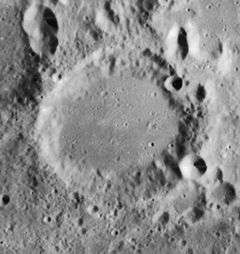Apianus (crater)
|
Lunar Orbiter 4 image | |
| Coordinates | 26°54′S 7°54′E / 26.9°S 7.9°ECoordinates: 26°54′S 7°54′E / 26.9°S 7.9°E |
|---|---|
| Diameter | 63 km |
| Depth | 2.08 km |
| Colongitude | 356° at sunrise |
| Eponym | Petrus Apianus |
Apianus is a lunar impact crater that is located on the rugged south-central highlands of the Moon. It is located to the northeast of the crater Aliacensis, and to the northwest of Poisson. The worn crater Krusenstern is attached to the west-northwestern rim.
The outer wall of the crater has been worn and eroded by subsequent impacts, and a pair of small craterlets overlay the rim to the southeast and northeast. The central crater is 63 kilometers in diameter and 2,080 meters deep.[1] The craterlet on the southeast rim, Apianus B, is a member of a cluster of co-joined craterlets that includes Apianus T and Apianus U. The interior floor of the central crater is relatively smooth and lacks a central peak, although the surface appears somewhat convex. Only a few tiny craterlets mark the surface.[2]
A variety of other nearby craters and craterlets belong to Apianus.
The crater is from the Nectarian period, 3.92 to 3.85 billion years ago.[1]
Apianus is named after 16th century German mathematician and astronomer Petrus Apianus.[1] The name applies as official international standard since 1935 and is registered at the International Astronomical Union (IAU).[3]
Satellite craters
By convention these features are identified on lunar maps by placing the letter on the side of the crater midpoint that is closest to Apianus.[4]
| Apianus | Latitude | Longitude | Diameter |
|---|---|---|---|
| A | 25.7° S | 6.6° E | 14 km |
| B | 27.4° S | 9.0° E | 10 km |
| C | 28.1° S | 10.5° E | 20 km |
| D | 26.1° S | 10.7° E | 35 km |
| E | 28.8° S | 8.2° E | 9 km |
| F | 28.1° S | 6.4° E | 6 km |
| G | 28.1° S | 7.7° E | 5 km |
| H | 28.1° S | 8.7° E | 7 km |
| J | 26.3° S | 8.6° E | 7 km |
| K | 27.4° S | 9.3° E | 7 km |
| L | 29.1° S | 10.9° E | 5 km |
| M | 24.7° S | 10.3° E | 7 km |
| N | 28.8° S | 9.9° E | 4 km |
| P | 25.2° S | 9.2° E | 40 km |
| R | 25.7° S | 8.9° E | 13 km |
| S | 25.6° S | 8.5° E | 8 km |
| T | 27.7° S | 9.5° E | 12 km |
| U | 27.9° S | 9.0° E | 16 km |
| V | 25.3° S | 10.5° E | 3 km |
| W | 25.5° S | 7.4° E | 9 km |
| X | 28.3° S | 7.1° E | 3 km |
References
- 1 2 3 Autostar Suite Astronomer Edition. CD-ROM. Meade, April 2006.
- ↑ Rükl, Antonín (1990). Atlas of the Moon. Kalmbach Books. ISBN 0-913135-17-8.
- ↑ M. A. Blagg; K. Müller; W. H. Wesley; S. A. Saunder; J. H. G. Franz (1935). Named Lunar Formations. London: Percy Lund, Humphries & Co. Ltd.
- ↑ Bussey, B.; Spudis, P. (2004). The Clementine Atlas of the Moon. New York: Cambridge University Press. ISBN 0-521-81528-2.
External links
- Crater Apianus in the Gazetteer of Planetary Nomenclature of the Astrogeology Research Program of the United States Geological Survey
- Crater Apianus: Lunar Map LAC-95 of the Aeronautical Chart and Information Center of the United States Air Force in the Lunar Map Catalog of the Lunar and Planetary Institute
- Crater Apianus: Available Lunar Maps according to the Astrogeology Research Program of the United States Geological Survey
- Crater Apianus in the Digital Lunar Orbiter Photographic Atlas of the Moon of the Lunar and Planetary Institute - Image IV-095-H3
- Crater Apianus in the Digital Lunar Orbiter Photographic Atlas of the Moon of the Lunar and Planetary Institute - Image IV-096-H1
- Crater Apianus in the Digital Lunar Orbiter Photographic Atlas of the Moon of the Lunar and Planetary Institute - Image IV-096-M
- Crater Apianus in the Digital Lunar Orbiter Photographic Atlas of the Moon of the Lunar and Planetary Institute - Image IV-100-H3
- Crater Apianus in the Digital Lunar Orbiter Photographic Atlas of the Moon of the Lunar and Planetary Institute - Image IV-101-H1
